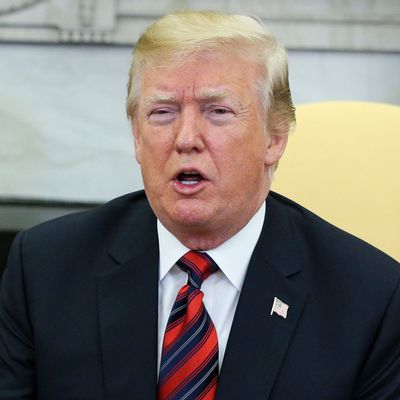
Two months ago, Donald Trump agreed to an unprecedented face-to-face meeting with the supreme leader of North Korea, on a whim. According to reports, the president accepted Kim Jong-un’s summit invitation before consulting his diplomatic advisers, or formulating a clear strategy for how to advance American interests through such an event.
He also, apparently, did not look into what, precisely, the word “denuclearize” means to the leadership of North Korea. If he did, he would have understood that Kim had never actually expressed openness to unilaterally forfeiting his entire nuclear arsenal. Instead, the White House was taken off guard last week, when Kim Kye-gwan, a leading diplomat for the North Korean regime, threatened to cancel the summit with Trump if America persisted in pushing for “unilateral nuclear abandonment.”
Thus, by the time South Korean president Moon Jae-in arrived at the White House Tuesday, Trump was no longer sure that the historic meeting he had scheduled for June 12 in Singapore would happen at all. Sitting beside Moon in the Oval office, Trump told reporters that the summit “may not work out for June 12,” and that “if it doesn’t happen, maybe it happens later.”
Moon, for his part, encouraged Trump to stay the course. The South Korean president expressed confidence that his American counterpart was capable of establishing “permanent peace” on the Korean peninsula, and reassured Trump that “the person who is in charge is President Trump.”
The American president acknowledged that relations between Washington and Pyongyang had soured in recent days. But he pinned responsibility for that development on China — suggesting that Kim’s combative attitude was a product of a second, secret meeting between Chinese president Xi Jinping and the North Korean leader.
“There was a somewhat different attitude after that meeting,” the president said of Kim. “I can’t say that I’m happy about it.”
But if any single person is responsible for the mood change in Pyongyang it is probably John Bolton, not Xi Jinping. Trump’s national security adviser recently suggested that the White House would demand the “Libya model” of denuclearization — an analogy that not only suggested the United States would demand the rapid dismantlement of North Korea’s entire nuclear weapons program, but also needlessly evoked the downside risk of denuclearization for a rogue regime: Not long after Muammar Qaddafi forfeited his nuclear weapons, the U.S. intervened to topple his government.
But the shadow hanging over the June 12 summit is larger than Bolton. A meeting between the American and North Korean leaders could realistically produce a worthwhile agreement for Pyongyang to reduce its nuclear capacity — and suspend further testing — in exchange for the United States reducing its military presence in the region. The trouble is the White House doesn’t appear to have any interest in such a deal. Rather, it wants North Korea to forfeit its entire nuclear program in exchange for access to Western capital. That pitch worked with Iran (until America went back on its word to Tehran, anyway). But Kim’s communist regime has highly ambivalent feelings toward Western investors reaching into its domestic economy — and, unlike Tehran, it already has many nuclear weapons.
All of which is to say: Having a Fox News addict conduct diplomacy by gut impulse might actually be a poor way for the United States to make foreign policy.






























